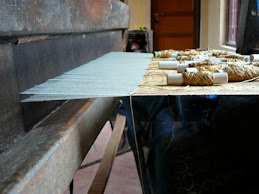I once read the quote, “to be born a daughter in Nepal is ill fate,” I was surprised, but not shocked. Knowing that women have been exploited and mistreated everywhere in the world, it only makes sense that it would be happening here as well.
Stacey and I have been given the opportunity to work with and meet some of the strongest women I have ever known or read about. They take action to improve the lives of women everywhere. These extraordinary women find bottom up solutions to support women in gaining strength and voice. This is done through the creation of job opportunity, an economic advantage and, ideally leads to an education and an improved livelihood for the women and their families.
Rita Thapa, Mohini Lama and Shyam Badan Shrestha are the three women that sit on the board of Dhaka Weaves, each run their own enterprise concurrently, their enterprises train and employ women. The Board members come from diverse backgrounds and have their own strategies, but their goal is the same; to empower women economically and politically in a country where the idea of gender equality isn’t so hip. They had, and still have, to face struggles because they are challenging social norms and ‘blowing the whistle’ on thousands of years of ill treatment.
Last week, Stacey and I took a trip to Pokhara, a beautiful city near the Annapurna mountain range. We went there for several reasons: 1. To get out of the city for a while, 2. To interview the Executive Director of a fair trade organization, Women’s Skill Development Project, Mrs. Ramkali Khadka 3. To meet Ashoka Fellow and the Program Director of Empowering Women of Nepal, Lucky K. Chhetri and 4. Maybe we would go trekking for a couple of days.
Mrs. Ramkali Khadka is a strong and independent woman, a little harder for me to follow than some of the other interviewees; still it was fascinating listening to her story and explanation of the creation of the Women’s Skill Development Project. This project was registered in 1975 and is now a not-for-profit, non-governmental-organization that is completely self-sufficient. They provide handicraft related skills training to poor, underprivileged Nepalese women so they can become self-reliant. Currently they are working with 280 women in 7 different areas, and about 80 employees work in the Pokhara compound, all women.
The business model is very interesting because much of the power lies in the hands of the producers. The producer groups decide their wages through a committee, much like the previously discussed, Kala Raksha. They produce 600 different products that are kept track of through computer systems. Women’s Skill Development Project also has many of the systems in place that we are supporting Dhaka Weaves in creating. The systems might take a while to get established, but we are planting the seed and helping Ratna and Bhindu understand why these systems are needed.
What I found most fascinating and relevant about our meeting is that Ramkali stated their orders went up dramatically after receiving the International Fair Trade Association (IFAT) certification and that IFAT membership fees are based on sales. IFAT is currently the highest level of membership in fair trade, leading to international networks of buyers and sellers. This reinforced the importance of fair trade certifications for Dhaka Weaves. We are working on the papers for a Fair Trade Group Nepal (FTGN) certification and don’t plan on stopping with that. IFAT is a membership that Dhaka Weaves can use to expand into broader markets. (To find out more about this project: www.wsdp.org.np ).
The next inspirational women that we met was Lucky K. Chhetri, this was truly an honor. Several years back, in 1993, Lucky and her two sisters opened a lodge and restaurant in Pokhara, where mainly trekkers would gather before and after their journeys. After a while, the sisters began hearing more and more women complain about having problems with their all male guides. Lucky took this challenge and used it as an opportunity. She had had some experience with mountaineering in Darjeeling and knew how strong the village women in the mountain areas were. Along with her sisters, Dicky and Nicky, they set up Three Sisters Adventure Trekking, which would have all women guides and porters. They started to market the job opportunities to the women in the area and to the tourist market. At first, no one responded to the ads, but slowly women began to come, both as employees and customers.
There was a big problem though, the women who were responding to the ad for work, couldn't’t speak English and they needed Training. The sisters went to a training to learn the critical information, and then changed it around to make it fun for the women. They have trained over 600 women and employ 80 during the high seasons. At first, many people saw this as exploiting women, and the sisters had to put up with a lot of social stigmas. Now there is a large demand for women guides and there are 2 annual trainings.
We decided to give the organization a try, but I will tell you more about our adventure later.
Sorry we haven’t been in touch recently. Pokhara was a little more expensive and we were pretty busy!
Subscribe to:
Post Comments (Atom)




















No comments:
Post a Comment